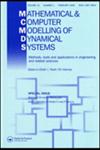Energy simulation and variable analysis of refining process in thermo-mechanical pulp mill using machine learning approach
IF 1.8
4区 数学
Q3 COMPUTER SCIENCE, INTERDISCIPLINARY APPLICATIONS
Mathematical and Computer Modelling of Dynamical Systems
Pub Date : 2021-01-02
DOI:10.1080/13873954.2021.1990967
引用次数: 6
Abstract
ABSTRACT Data from two thermo-mechanical pulp mills are collected to simulate the refining process using deep learning. A multilayer perceptron neural network is utilized for pattern recognition of the refining variables. Results show the impressive capability of artificial intelligence methods in refining energy simulation so that the correlation coefficient of 98% is accessible. A comprehensive parametric study has been made to investigate the effect of refining disturbance variables, plate gap and dilution water on refining energy simulation. The generated model reveals the non-linear hidden pattern between refining variables, which can be used for optimal refining control strategy. Considering the disturbance variables’ effect in refining energy simulation, model accuracy could increase by 15%. Removing the plate gape from predictive variables reduces the simulation determination coefficient by up to 25% in both mills, while the mentioned value for removing dilution water is 9–17% in mill 1 and about 35% in mill 2.基于机器学习方法的热力机械式纸浆机精炼过程能量模拟与变量分析
摘要:收集了来自两个热机械纸浆厂的数据,使用深度学习模拟精炼过程。利用多层感知器神经网络对精炼变量进行模式识别。结果表明,人工智能方法在精炼能量模拟方面具有令人印象深刻的能力,相关系数可达98%。对精炼扰动变量、板间隙和稀释水对精炼能量模拟的影响进行了全面的参数研究。生成的模型揭示了精炼变量之间的非线性隐藏模式,可用于优化精炼控制策略。在精炼能量模拟中,考虑扰动变量的影响,模型精度可以提高15%。在两个磨机中,从预测变量中去除板间隙可将模拟确定系数降低25%,而在磨机1中去除稀释水的上述值为9-17%,在磨机2中约为35%。
本文章由计算机程序翻译,如有差异,请以英文原文为准。
求助全文
约1分钟内获得全文
求助全文
来源期刊
CiteScore
3.80
自引率
5.30%
发文量
7
审稿时长
>12 weeks
期刊介绍:
Mathematical and Computer Modelling of Dynamical Systems (MCMDS) publishes high quality international research that presents new ideas and approaches in the derivation, simplification, and validation of models and sub-models of relevance to complex (real-world) dynamical systems.
The journal brings together engineers and scientists working in different areas of application and/or theory where researchers can learn about recent developments across engineering, environmental systems, and biotechnology amongst other fields. As MCMDS covers a wide range of application areas, papers aim to be accessible to readers who are not necessarily experts in the specific area of application.
MCMDS welcomes original articles on a range of topics including:
-methods of modelling and simulation-
automation of modelling-
qualitative and modular modelling-
data-based and learning-based modelling-
uncertainties and the effects of modelling errors on system performance-
application of modelling to complex real-world systems.

 求助内容:
求助内容: 应助结果提醒方式:
应助结果提醒方式:


